Deck 7: Multivariable Calculus
Question
Question
Question
Question
Question
Question
Question
Question
Question
Question
Question
Question
Question
Question
Question
Question
Question
Question
Question
Question
Question
Question
Question
Question
Question
Question
Question
Question
Question
Question
Question
Question
Question
Question
Question
Question
Question
Question
Question
Question
Question
Question
Question
Question
Question
Question
Question
Question
Question
Question
Question
Question
Question
Question
Question
Question
Question
Question
Question
Question
Question
Question
Question
Question
Question
Question
Question
Question
Question
Question
Question
Question
Question
Question
Question
Question
Question
Question

Unlock Deck
Sign up to unlock the cards in this deck!
Unlock Deck
Unlock Deck
1/78
Play
Full screen (f)
Deck 7: Multivariable Calculus
1
Choose the surface that the function describes.

A)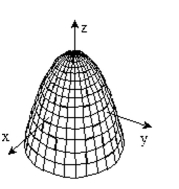
B)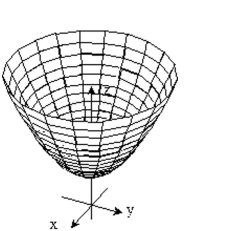
C)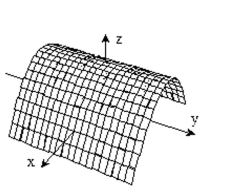
D)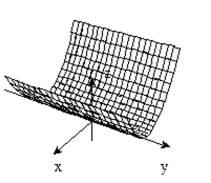

A)

B)

C)

D)


2
Find the value.
Find f(2, -1, 4) for f(x, y, z) =
A) -5
B) 13
C) 5
D) 27
Find f(2, -1, 4) for f(x, y, z) =

A) -5
B) 13
C) 5
D) 27
5
3
Choose the surface that the function describes.
f(x, y) = 5
A)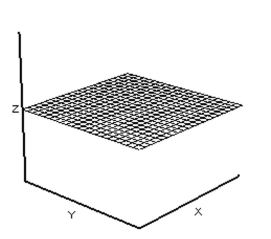
B)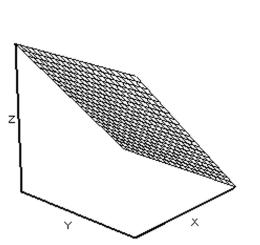
C)
D)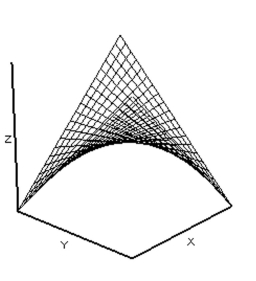
f(x, y) = 5
A)

B)

C)

D)


4
Find the partial derivative.
For
A) 12
B) 36
C) 24
D) -12
For

A) 12
B) 36
C) 24
D) -12

Unlock Deck
Unlock for access to all 78 flashcards in this deck.
Unlock Deck
k this deck
5
Find the partial derivative.
Let z =
A)
B) -12x - 18y
C) 10x - 12y
D)
Let z =

A)

B) -12x - 18y
C) 10x - 12y
D)


Unlock Deck
Unlock for access to all 78 flashcards in this deck.
Unlock Deck
k this deck
6
Find the value.
Let Find f(4, -7).
Find f(4, -7).
A) 198
B) (4, -7) is not in the domain of f.
C) -24
D) -119
Let
 Find f(4, -7).
Find f(4, -7).A) 198
B) (4, -7) is not in the domain of f.
C) -24
D) -119

Unlock Deck
Unlock for access to all 78 flashcards in this deck.
Unlock Deck
k this deck
7
Solve the problem.
The number of cows that can graze on a ranch is approximated by C(x,y) = 9x + 5y - 4, where x is the number of acres of grass and y the number of acres of alfalfa. If the ranch has 30 acres of alfalfa and 25 acres of grass, how
Many cows may graze?
A) 395 cows
B) 371 cows
C) 375 cows
D) 391 cows
The number of cows that can graze on a ranch is approximated by C(x,y) = 9x + 5y - 4, where x is the number of acres of grass and y the number of acres of alfalfa. If the ranch has 30 acres of alfalfa and 25 acres of grass, how
Many cows may graze?
A) 395 cows
B) 371 cows
C) 375 cows
D) 391 cows

Unlock Deck
Unlock for access to all 78 flashcards in this deck.
Unlock Deck
k this deck
8
Find the partial derivative.
Find
A) -32
B) 20
C) 92
D) -20
Find

A) -32
B) 20
C) 92
D) -20

Unlock Deck
Unlock for access to all 78 flashcards in this deck.
Unlock Deck
k this deck
9
Find the value.
Find f(-3, 1, 5) for f(x, y, z) =
A) -5
B) 1
C) 10
D) -4
Find f(-3, 1, 5) for f(x, y, z) =

A) -5
B) 1
C) 10
D) -4

Unlock Deck
Unlock for access to all 78 flashcards in this deck.
Unlock Deck
k this deck
10
Solve the problem.
The productivity of a petroleum company is given approximately by the function where x is the utilization of labor and y is the utilization of capital. If the company uses 1200 units of labor and 2100 units
where x is the utilization of labor and y is the utilization of capital. If the company uses 1200 units of labor and 2100 units
Of capital, how many units of petroleum will be produced? Round to the nearest whole unit.
A) 150,000 units
B) 175,174 units
C) 105,074 units
D) 117,517 units
The productivity of a petroleum company is given approximately by the function
 where x is the utilization of labor and y is the utilization of capital. If the company uses 1200 units of labor and 2100 units
where x is the utilization of labor and y is the utilization of capital. If the company uses 1200 units of labor and 2100 unitsOf capital, how many units of petroleum will be produced? Round to the nearest whole unit.
A) 150,000 units
B) 175,174 units
C) 105,074 units
D) 117,517 units

Unlock Deck
Unlock for access to all 78 flashcards in this deck.
Unlock Deck
k this deck
11
Choose the surface that the function describes.
f(x, y) = 1 - x - 2y
A)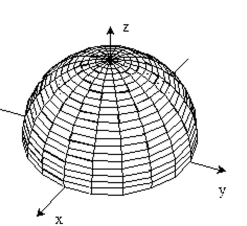
B)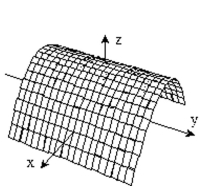
C)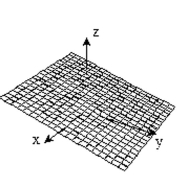
D)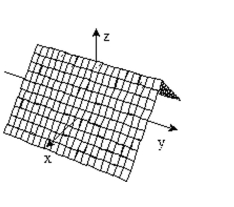
f(x, y) = 1 - x - 2y
A)

B)

C)

D)


Unlock Deck
Unlock for access to all 78 flashcards in this deck.
Unlock Deck
k this deck
12
Solve the problem.
The Cobb-Douglas production function for a steel company is given by f(x, y) = 78x0.3y0.7 where x is the utilization of labor and y is the utilization of capital. If the company uses 1500 units of labor and 2200 units of
Capital, how many units of steel will be produced? Round to the nearest whole unit.
A) 5,405,400,000 units
B) 656,640 units
C) 54,054,000 units
D) 152,974 units
The Cobb-Douglas production function for a steel company is given by f(x, y) = 78x0.3y0.7 where x is the utilization of labor and y is the utilization of capital. If the company uses 1500 units of labor and 2200 units of
Capital, how many units of steel will be produced? Round to the nearest whole unit.
A) 5,405,400,000 units
B) 656,640 units
C) 54,054,000 units
D) 152,974 units

Unlock Deck
Unlock for access to all 78 flashcards in this deck.
Unlock Deck
k this deck
13
Find the partial derivative.
Find
A) - 86
B) 170
C) 86
D) -170
Find

A) - 86
B) 170
C) 86
D) -170

Unlock Deck
Unlock for access to all 78 flashcards in this deck.
Unlock Deck
k this deck
14
Find the value.
Let Find f(4, 8).
Find f(4, 8).
A) 40
B) 258
C) 36
D) 136
Let
 Find f(4, 8).
Find f(4, 8).A) 40
B) 258
C) 36
D) 136

Unlock Deck
Unlock for access to all 78 flashcards in this deck.
Unlock Deck
k this deck
15
Solve the problem.
The volume of a flower pot is given by where
where  is the major radius and
is the major radius and  is the minor radius and h is the height of the pot (see figure below).
is the minor radius and h is the height of the pot (see figure below). 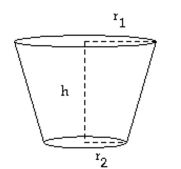 If the dimensions of the pot are
If the dimensions of the pot are  = 5 inches,
= 5 inches,  = 3 inches and h = 6 inches, find the volume of potting soil
= 3 inches and h = 6 inches, find the volume of potting soil
Required to fill the pot to the top. Round to the nearest cubic inch.
A)
B)
C)
D)
The volume of a flower pot is given by
 where
where  is the major radius and
is the major radius and  is the minor radius and h is the height of the pot (see figure below).
is the minor radius and h is the height of the pot (see figure below).  If the dimensions of the pot are
If the dimensions of the pot are  = 5 inches,
= 5 inches,  = 3 inches and h = 6 inches, find the volume of potting soil
= 3 inches and h = 6 inches, find the volume of potting soilRequired to fill the pot to the top. Round to the nearest cubic inch.
A)

B)

C)

D)


Unlock Deck
Unlock for access to all 78 flashcards in this deck.
Unlock Deck
k this deck
16
Solve the problem.
Poiseuille's law states that the resistance, R, for blood in a blood vessel varies directly as the length of the vessel, L, and inversely as the fourth power of its diameter, d. This can be written as an equation where
where
K is a constant. Find R(5, 0.3). Round your answer to the nearest whole number.
A) about 61.7k
B) about 617k
C) about 16.67k
D) about 630k
Poiseuille's law states that the resistance, R, for blood in a blood vessel varies directly as the length of the vessel, L, and inversely as the fourth power of its diameter, d. This can be written as an equation
 where
whereK is a constant. Find R(5, 0.3). Round your answer to the nearest whole number.
A) about 61.7k
B) about 617k
C) about 16.67k
D) about 630k

Unlock Deck
Unlock for access to all 78 flashcards in this deck.
Unlock Deck
k this deck
17
Solve the problem.
The marketing research department of a large manufacturing company has determined that the demand equations for two major items it produces are given by p = 2,000 - 5x + 8y and q = 4,000 + 9x - 7y where p is the
Price of item A, q is the price of item B, x is the monthly demand for item A, and y is the monthly demand for
Item B. Find the total monthly revenue from items A and B when x = 15 and y = 5.
A) $20,565
B) $50,195
C) $49,975
D) $29,415
The marketing research department of a large manufacturing company has determined that the demand equations for two major items it produces are given by p = 2,000 - 5x + 8y and q = 4,000 + 9x - 7y where p is the
Price of item A, q is the price of item B, x is the monthly demand for item A, and y is the monthly demand for
Item B. Find the total monthly revenue from items A and B when x = 15 and y = 5.
A) $20,565
B) $50,195
C) $49,975
D) $29,415

Unlock Deck
Unlock for access to all 78 flashcards in this deck.
Unlock Deck
k this deck
18
Solve the problem.
The surface area of a human body (in square meters) is approximated by A = 0.202W(.425)H(.725), where W is the weight of the person in kilograms and H is the height in meters. Find A if W = 74 and H = 1.61.
A)
B)
C)
D)
The surface area of a human body (in square meters) is approximated by A = 0.202W(.425)H(.725), where W is the weight of the person in kilograms and H is the height in meters. Find A if W = 74 and H = 1.61.
A)

B)

C)

D)


Unlock Deck
Unlock for access to all 78 flashcards in this deck.
Unlock Deck
k this deck
19
Find the value.
Let . Find f(6, 6).
. Find f(6, 6).
A) 1
B) 37
C) 72
D) 35
Let
 . Find f(6, 6).
. Find f(6, 6).A) 1
B) 37
C) 72
D) 35

Unlock Deck
Unlock for access to all 78 flashcards in this deck.
Unlock Deck
k this deck
20
Find the value.
Find f(-8, 8) when f(x, y) = 3x + 5y - 8
A) 5
B) 16
C) 8
D) 3
Find f(-8, 8) when f(x, y) = 3x + 5y - 8
A) 5
B) 16
C) 8
D) 3

Unlock Deck
Unlock for access to all 78 flashcards in this deck.
Unlock Deck
k this deck
21
Find the partial derivative.
Find
A) 8
B) -48
C) 16
D) 40
Find

A) 8
B) -48
C) 16
D) 40

Unlock Deck
Unlock for access to all 78 flashcards in this deck.
Unlock Deck
k this deck
22
Find the partial derivative.
Find fx for f(x, y) = 3 .
3 .
A)
B)
C)
D)
Find fx for f(x, y) =
 3 .
3 .A)

B)

C)

D)


Unlock Deck
Unlock for access to all 78 flashcards in this deck.
Unlock Deck
k this deck
23
Find the partial derivative.
Find
A) 8x - 11y
B) -11x - 12y
C)
D)
Find

A) 8x - 11y
B) -11x - 12y
C)

D)


Unlock Deck
Unlock for access to all 78 flashcards in this deck.
Unlock Deck
k this deck
24
Provide an appropriate response.
Find fxy for the function
Find fxy for the function


Unlock Deck
Unlock for access to all 78 flashcards in this deck.
Unlock Deck
k this deck
25
Provide an appropriate response.
Find the local extrema for
A) f(0, 0) = 0 is a minimum
B) f(0, 2) = 4 is a maximum
C) f(2, 0) = -16 is a minimum
D) f(0, 0) = 0 is a maximum
Find the local extrema for

A) f(0, 0) = 0 is a minimum
B) f(0, 2) = 4 is a maximum
C) f(2, 0) = -16 is a minimum
D) f(0, 0) = 0 is a maximum

Unlock Deck
Unlock for access to all 78 flashcards in this deck.
Unlock Deck
k this deck
26
Provide an appropriate response.
Find the local extrema for
A) f(5, 2) = -13 is a minimum
B) f(1, 1) = -1 is a minimum
C) f(-5, 2) = 55 is a maximum
D) f(0, 0) = 1 is a minimum
Find the local extrema for

A) f(5, 2) = -13 is a minimum
B) f(1, 1) = -1 is a minimum
C) f(-5, 2) = 55 is a maximum
D) f(0, 0) = 1 is a minimum

Unlock Deck
Unlock for access to all 78 flashcards in this deck.
Unlock Deck
k this deck
27
Provide an appropriate response.
Find critical points for
A) (4, -3)
B) (-4, 3)
C) (4, 3)
D) (-4, -3)
Find critical points for

A) (4, -3)
B) (-4, 3)
C) (4, 3)
D) (-4, -3)

Unlock Deck
Unlock for access to all 78 flashcards in this deck.
Unlock Deck
k this deck
28
Provide an appropriate response.
Find the critical points for
A) (-2, -1)
B) (-2, 1)
C) (2, -1)
D) (2, 1)
Find the critical points for

A) (-2, -1)
B) (-2, 1)
C) (2, -1)
D) (2, 1)

Unlock Deck
Unlock for access to all 78 flashcards in this deck.
Unlock Deck
k this deck
29
Provide an appropriate response.
Find
A) -28
B)
C) -14
D)
Find

A) -28
B)

C) -14
D)


Unlock Deck
Unlock for access to all 78 flashcards in this deck.
Unlock Deck
k this deck
30
Provide an appropriate response.
Find the local extrema for
A) f(1, 1) = -1 is a local minimum
B) f(2, 2) = 41 is a local maximum
C) f(-2, -2) = 9 is a local maximum
D) f(0, 0) = 1 is a local minimum
Find the local extrema for

A) f(1, 1) = -1 is a local minimum
B) f(2, 2) = 41 is a local maximum
C) f(-2, -2) = 9 is a local maximum
D) f(0, 0) = 1 is a local minimum

Unlock Deck
Unlock for access to all 78 flashcards in this deck.
Unlock Deck
k this deck
31
Solve the problem.
The productivity of a major manufacturer of microwave ovens is given approximately by the Cobb-Douglas production function with the utilization of x units of labor and y units of capital. If the
with the utilization of x units of labor and y units of capital. If the
Company is currently utilizing 4500 units of labor and 2000 units of capital, find the marginal productivity of
Labor to the nearest unit.
A) 129 units
B) 2 units
C) 217 units
D) 32 units
The productivity of a major manufacturer of microwave ovens is given approximately by the Cobb-Douglas production function
 with the utilization of x units of labor and y units of capital. If the
with the utilization of x units of labor and y units of capital. If theCompany is currently utilizing 4500 units of labor and 2000 units of capital, find the marginal productivity of
Labor to the nearest unit.
A) 129 units
B) 2 units
C) 217 units
D) 32 units

Unlock Deck
Unlock for access to all 78 flashcards in this deck.
Unlock Deck
k this deck
32
Provide an appropriate response.
Find fxy for
A)
B)
C)
D)
Find fxy for

A)

B)

C)

D)


Unlock Deck
Unlock for access to all 78 flashcards in this deck.
Unlock Deck
k this deck
33
Provide an appropriate response.
Find the local extrema for
A) (2, 1) = -8 is a minimum
B) (- 2, - 1) = 9 is a maximum
C) (- 2, 1) = 9 is a minimum
D) (2, 1) = -8 is a maximum
Find the local extrema for

A) (2, 1) = -8 is a minimum
B) (- 2, - 1) = 9 is a maximum
C) (- 2, 1) = 9 is a minimum
D) (2, 1) = -8 is a maximum

Unlock Deck
Unlock for access to all 78 flashcards in this deck.
Unlock Deck
k this deck
34
Solve the problem.
A company has the following production function for a certain product Find the marginal productivity with fixed capital, Px .
Find the marginal productivity with fixed capital, Px .
A)
B)
C)
D)
A company has the following production function for a certain product
 Find the marginal productivity with fixed capital, Px .
Find the marginal productivity with fixed capital, Px .A)

B)

C)

D)


Unlock Deck
Unlock for access to all 78 flashcards in this deck.
Unlock Deck
k this deck
35
Solve the problem.
Suppose that the labor cost for a building is approximated by where x is the number of days of skilled labor and y is the number of days of semiskilled labor required. Find the x and
where x is the number of days of skilled labor and y is the number of days of semiskilled labor required. Find the x and
Y that minimize cost C.
A) x = 8, y = 210
B) x = 105, y = 42
C) x = 4, y = 105
D) x = 42, y = 315
Suppose that the labor cost for a building is approximated by
 where x is the number of days of skilled labor and y is the number of days of semiskilled labor required. Find the x and
where x is the number of days of skilled labor and y is the number of days of semiskilled labor required. Find the x andY that minimize cost C.
A) x = 8, y = 210
B) x = 105, y = 42
C) x = 4, y = 105
D) x = 42, y = 315

Unlock Deck
Unlock for access to all 78 flashcards in this deck.
Unlock Deck
k this deck
36
Solve the problem.
The production function z for an industrial country was estimated as where x is the amount of labor and y, the amount of capital. Find the marginal productivity of labor.
where x is the amount of labor and y, the amount of capital. Find the marginal productivity of labor.
A)
B)
C)
D)
The production function z for an industrial country was estimated as
 where x is the amount of labor and y, the amount of capital. Find the marginal productivity of labor.
where x is the amount of labor and y, the amount of capital. Find the marginal productivity of labor.A)

B)

C)

D)


Unlock Deck
Unlock for access to all 78 flashcards in this deck.
Unlock Deck
k this deck
37
Solve the problem.
The profit function for sales of two models of television sets at a chain discount store is given by where x is the number of sales per week of model A, and y is the number of sales per week of model B. Find Px(10, 15) and interpret the result.
where x is the number of sales per week of model A, and y is the number of sales per week of model B. Find Px(10, 15) and interpret the result.
A) At a sales level of 10 units of model A and 15 units of model B, increasing sales of model A by one unit and holding
At a sales level of 10 units of model A and 15 units of model B, increasing sales of model A by one unit and holding
Sales of model B at 15 units will increase profit by approximately $60
B) At a sales level of 10 units of model A and 15 units of model B, increasing sales of model A by one unit and holding
At a sales level of 10 units of model A and 15 units of model B, increasing sales of model A by one unit and holding
Sales of model B at 15 units will increase profit by approximately $80.
C) At a sales level of 10 units of model A and 15 units of model B, increasing sales of model A by one unit and holding
At a sales level of 10 units of model A and 15 units of model B, increasing sales of model A by one unit and holding
Sales of model B at 15 units will increase profit by approximately $120
D) At a sales level of 10 units of model A and 15 units of model B, increasing sales of model A by one unit and holding
At a sales level of 10 units of model A and 15 units of model B, increasing sales of model A by one unit and holding
Sales of model B at 15 units will increase profit by approximately $140
The profit function for sales of two models of television sets at a chain discount store is given by
 where x is the number of sales per week of model A, and y is the number of sales per week of model B. Find Px(10, 15) and interpret the result.
where x is the number of sales per week of model A, and y is the number of sales per week of model B. Find Px(10, 15) and interpret the result.A)
 At a sales level of 10 units of model A and 15 units of model B, increasing sales of model A by one unit and holding
At a sales level of 10 units of model A and 15 units of model B, increasing sales of model A by one unit and holdingSales of model B at 15 units will increase profit by approximately $60
B)
 At a sales level of 10 units of model A and 15 units of model B, increasing sales of model A by one unit and holding
At a sales level of 10 units of model A and 15 units of model B, increasing sales of model A by one unit and holdingSales of model B at 15 units will increase profit by approximately $80.
C)
 At a sales level of 10 units of model A and 15 units of model B, increasing sales of model A by one unit and holding
At a sales level of 10 units of model A and 15 units of model B, increasing sales of model A by one unit and holdingSales of model B at 15 units will increase profit by approximately $120
D)
 At a sales level of 10 units of model A and 15 units of model B, increasing sales of model A by one unit and holding
At a sales level of 10 units of model A and 15 units of model B, increasing sales of model A by one unit and holdingSales of model B at 15 units will increase profit by approximately $140

Unlock Deck
Unlock for access to all 78 flashcards in this deck.
Unlock Deck
k this deck
38
Provide an appropriate response.
For
A)
B)
C) 12
D)
For

A)

B)

C) 12
D)


Unlock Deck
Unlock for access to all 78 flashcards in this deck.
Unlock Deck
k this deck
39
Solve the problem.
A company uses TV and magazines for advertising. They know that profit P is related to the amounts T spent on TV and M spent on magazines by the equation where P, M, and T are in hundreds
where P, M, and T are in hundreds
Of thousands. Find the maximum profit.
A) $120,000
B) $130,000
C) $260,000
D) $240,000
A company uses TV and magazines for advertising. They know that profit P is related to the amounts T spent on TV and M spent on magazines by the equation
 where P, M, and T are in hundreds
where P, M, and T are in hundredsOf thousands. Find the maximum profit.
A) $120,000
B) $130,000
C) $260,000
D) $240,000

Unlock Deck
Unlock for access to all 78 flashcards in this deck.
Unlock Deck
k this deck
40
Provide an appropriate response.
Find .
.
A)
B)
C)
D)
Find
 .
.A)

B)

C)

D)


Unlock Deck
Unlock for access to all 78 flashcards in this deck.
Unlock Deck
k this deck
41
Solve the problem.
The market research department for a drug store chain arrived at the demand table below, where y is the number of bottles of multivitamins purchased per month (in thousands) at x dollars per bottle.![<strong>Solve the problem. The market research department for a drug store chain arrived at the demand table below, where y is the number of bottles of multivitamins purchased per month (in thousands) at x dollars per bottle. I) Find a demand equation using the method of least squares. II) If each bottle of multivitamins costs the drug store chain $4, how should it be priced to achieve a maximum monthly Profit? [Hint: Use the result from I) with C = 4y, R = xy, and P = R - C.]</strong> A) B) C) D)](https://d2lvgg3v3hfg70.cloudfront.net/TB8593/11ebb6d7_4899_44e3_b437_29e06545ce0d_TB8593_00.jpg) I) Find a demand equation using the method of least squares.
I) Find a demand equation using the method of least squares.
II) If each bottle of multivitamins costs the drug store chain $4, how should it be priced to achieve a maximum monthly
Profit? [Hint: Use the result from I) with C = 4y, R = xy, and P = R - C.]
A)![<strong>Solve the problem. The market research department for a drug store chain arrived at the demand table below, where y is the number of bottles of multivitamins purchased per month (in thousands) at x dollars per bottle. I) Find a demand equation using the method of least squares. II) If each bottle of multivitamins costs the drug store chain $4, how should it be priced to achieve a maximum monthly Profit? [Hint: Use the result from I) with C = 4y, R = xy, and P = R - C.]</strong> A) B) C) D)](https://d2lvgg3v3hfg70.cloudfront.net/TB8593/11ebb6d7_4899_6bf4_b437_27b9631387f1_TB8593_11.jpg)
B)![<strong>Solve the problem. The market research department for a drug store chain arrived at the demand table below, where y is the number of bottles of multivitamins purchased per month (in thousands) at x dollars per bottle. I) Find a demand equation using the method of least squares. II) If each bottle of multivitamins costs the drug store chain $4, how should it be priced to achieve a maximum monthly Profit? [Hint: Use the result from I) with C = 4y, R = xy, and P = R - C.]</strong> A) B) C) D)](https://d2lvgg3v3hfg70.cloudfront.net/TB8593/11ebb6d7_4899_6bf5_b437_a3658df008b8_TB8593_11.jpg)
C)![<strong>Solve the problem. The market research department for a drug store chain arrived at the demand table below, where y is the number of bottles of multivitamins purchased per month (in thousands) at x dollars per bottle. I) Find a demand equation using the method of least squares. II) If each bottle of multivitamins costs the drug store chain $4, how should it be priced to achieve a maximum monthly Profit? [Hint: Use the result from I) with C = 4y, R = xy, and P = R - C.]</strong> A) B) C) D)](https://d2lvgg3v3hfg70.cloudfront.net/TB8593/11ebb6d7_4899_6bf6_b437_df741c4fd1d9_TB8593_11.jpg)
D)![<strong>Solve the problem. The market research department for a drug store chain arrived at the demand table below, where y is the number of bottles of multivitamins purchased per month (in thousands) at x dollars per bottle. I) Find a demand equation using the method of least squares. II) If each bottle of multivitamins costs the drug store chain $4, how should it be priced to achieve a maximum monthly Profit? [Hint: Use the result from I) with C = 4y, R = xy, and P = R - C.]</strong> A) B) C) D)](https://d2lvgg3v3hfg70.cloudfront.net/TB8593/11ebb6d7_4899_6bf7_b437_7f19471c8fb8_TB8593_11.jpg)
The market research department for a drug store chain arrived at the demand table below, where y is the number of bottles of multivitamins purchased per month (in thousands) at x dollars per bottle.
![<strong>Solve the problem. The market research department for a drug store chain arrived at the demand table below, where y is the number of bottles of multivitamins purchased per month (in thousands) at x dollars per bottle. I) Find a demand equation using the method of least squares. II) If each bottle of multivitamins costs the drug store chain $4, how should it be priced to achieve a maximum monthly Profit? [Hint: Use the result from I) with C = 4y, R = xy, and P = R - C.]</strong> A) B) C) D)](https://d2lvgg3v3hfg70.cloudfront.net/TB8593/11ebb6d7_4899_44e3_b437_29e06545ce0d_TB8593_00.jpg) I) Find a demand equation using the method of least squares.
I) Find a demand equation using the method of least squares.II) If each bottle of multivitamins costs the drug store chain $4, how should it be priced to achieve a maximum monthly
Profit? [Hint: Use the result from I) with C = 4y, R = xy, and P = R - C.]
A)
![<strong>Solve the problem. The market research department for a drug store chain arrived at the demand table below, where y is the number of bottles of multivitamins purchased per month (in thousands) at x dollars per bottle. I) Find a demand equation using the method of least squares. II) If each bottle of multivitamins costs the drug store chain $4, how should it be priced to achieve a maximum monthly Profit? [Hint: Use the result from I) with C = 4y, R = xy, and P = R - C.]</strong> A) B) C) D)](https://d2lvgg3v3hfg70.cloudfront.net/TB8593/11ebb6d7_4899_6bf4_b437_27b9631387f1_TB8593_11.jpg)
B)
![<strong>Solve the problem. The market research department for a drug store chain arrived at the demand table below, where y is the number of bottles of multivitamins purchased per month (in thousands) at x dollars per bottle. I) Find a demand equation using the method of least squares. II) If each bottle of multivitamins costs the drug store chain $4, how should it be priced to achieve a maximum monthly Profit? [Hint: Use the result from I) with C = 4y, R = xy, and P = R - C.]</strong> A) B) C) D)](https://d2lvgg3v3hfg70.cloudfront.net/TB8593/11ebb6d7_4899_6bf5_b437_a3658df008b8_TB8593_11.jpg)
C)
![<strong>Solve the problem. The market research department for a drug store chain arrived at the demand table below, where y is the number of bottles of multivitamins purchased per month (in thousands) at x dollars per bottle. I) Find a demand equation using the method of least squares. II) If each bottle of multivitamins costs the drug store chain $4, how should it be priced to achieve a maximum monthly Profit? [Hint: Use the result from I) with C = 4y, R = xy, and P = R - C.]</strong> A) B) C) D)](https://d2lvgg3v3hfg70.cloudfront.net/TB8593/11ebb6d7_4899_6bf6_b437_df741c4fd1d9_TB8593_11.jpg)
D)
![<strong>Solve the problem. The market research department for a drug store chain arrived at the demand table below, where y is the number of bottles of multivitamins purchased per month (in thousands) at x dollars per bottle. I) Find a demand equation using the method of least squares. II) If each bottle of multivitamins costs the drug store chain $4, how should it be priced to achieve a maximum monthly Profit? [Hint: Use the result from I) with C = 4y, R = xy, and P = R - C.]</strong> A) B) C) D)](https://d2lvgg3v3hfg70.cloudfront.net/TB8593/11ebb6d7_4899_6bf7_b437_7f19471c8fb8_TB8593_11.jpg)

Unlock Deck
Unlock for access to all 78 flashcards in this deck.
Unlock Deck
k this deck
42
Evaluate.

A)
B)
C)
D)

A)

B)

C)

D)


Unlock Deck
Unlock for access to all 78 flashcards in this deck.
Unlock Deck
k this deck
43
Solve the problem.
The rectangular box below, with an open top and one partition, is to be constructed from 18 square inches of cardboard. Find the dimensions that will result in a box with the largest possible volume.
A) 2 inches by 3 inches by 1 inch
B) 2 inches by 2 inches by 1 inch
C) 3 inches by 2 inches by 1 inch
D) 3 inches by 3 inches by 1 inch
The rectangular box below, with an open top and one partition, is to be constructed from 18 square inches of cardboard. Find the dimensions that will result in a box with the largest possible volume.

A) 2 inches by 3 inches by 1 inch
B) 2 inches by 2 inches by 1 inch
C) 3 inches by 2 inches by 1 inch
D) 3 inches by 3 inches by 1 inch

Unlock Deck
Unlock for access to all 78 flashcards in this deck.
Unlock Deck
k this deck
44
Provide an appropriate response.
Find the least squares line for the following data:
A) y = 0.74x + 23.04
B) y = - 0.74x - 23.04
C) y = 1.29x - 26.83
D) y = 13.46x + 0.04
Find the least squares line for the following data:

A) y = 0.74x + 23.04
B) y = - 0.74x - 23.04
C) y = 1.29x - 26.83
D) y = 13.46x + 0.04

Unlock Deck
Unlock for access to all 78 flashcards in this deck.
Unlock Deck
k this deck
45
Provide an appropriate response.
Find the least squares line for the points (4, 3), (6, 6), (8, 0), and (9, 9). Graph the data and the least squares line on the same axes.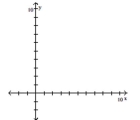
A)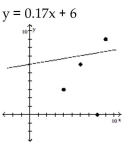
B)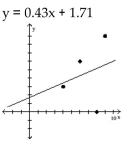
C)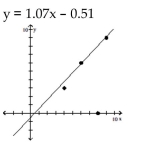
D)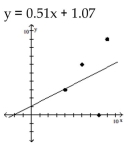
Find the least squares line for the points (4, 3), (6, 6), (8, 0), and (9, 9). Graph the data and the least squares line on the same axes.

A)

B)

C)

D)


Unlock Deck
Unlock for access to all 78 flashcards in this deck.
Unlock Deck
k this deck
46
Provide an appropriate response.
Consider the following data on the growth of peach grafts under controlled conditions.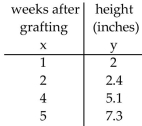 Find the regression line y = ax + b.
Find the regression line y = ax + b.
A) y = 13x + 8.19
B) y = 1.33x + 0.21
C) y =1.50 x + 0.7
D) y = -2.10x + 0.2
Consider the following data on the growth of peach grafts under controlled conditions.
 Find the regression line y = ax + b.
Find the regression line y = ax + b.A) y = 13x + 8.19
B) y = 1.33x + 0.21
C) y =1.50 x + 0.7
D) y = -2.10x + 0.2

Unlock Deck
Unlock for access to all 78 flashcards in this deck.
Unlock Deck
k this deck
47
Solve the problem.
The Cobb-Douglas function for a new product is given by where x is the number of units of labor and y is the number of units of capital required to produce N(x, y) units of the product. Each unit of
where x is the number of units of labor and y is the number of units of capital required to produce N(x, y) units of the product. Each unit of
Labor costs $40, and each unit of capital costs $80. If $400,000 has been budgeted for the production of this
Product, determine how this amount should be allocated in order to maximize production, and find the
Maximum production.
A)
B)
C)
D)
The Cobb-Douglas function for a new product is given by
 where x is the number of units of labor and y is the number of units of capital required to produce N(x, y) units of the product. Each unit of
where x is the number of units of labor and y is the number of units of capital required to produce N(x, y) units of the product. Each unit ofLabor costs $40, and each unit of capital costs $80. If $400,000 has been budgeted for the production of this
Product, determine how this amount should be allocated in order to maximize production, and find the
Maximum production.
A)

B)

C)

D)


Unlock Deck
Unlock for access to all 78 flashcards in this deck.
Unlock Deck
k this deck
48
Provide an appropriate response.
Use Lagrange multipliers to maximize f(x, y, z) = 24x + 12y + 24z subject to
A) max f(x, y, z) = f(12, 12, 12) = 720
B) max f(x, y, z) = f(6, 12, 12) = 576
C) max f(x, y, z) = f(12, 12, 6) = 576
D) max f(x, y, z) = f(12, 6, 12) = 648
Use Lagrange multipliers to maximize f(x, y, z) = 24x + 12y + 24z subject to

A) max f(x, y, z) = f(12, 12, 12) = 720
B) max f(x, y, z) = f(6, 12, 12) = 576
C) max f(x, y, z) = f(12, 12, 6) = 576
D) max f(x, y, z) = f(12, 6, 12) = 648

Unlock Deck
Unlock for access to all 78 flashcards in this deck.
Unlock Deck
k this deck
49
Provide an appropriate response.
Refer to the table given below. Find the least squares line and use it to estimate y when x = 15.
Refer to the table given below. Find the least squares line and use it to estimate y when x = 15.


Unlock Deck
Unlock for access to all 78 flashcards in this deck.
Unlock Deck
k this deck
50
Solve the problem.
The total cost to produce MP3 players in 2 models is given by where red model is x and the green one is y. If a total of 60 players must be made, how should production be allocated so that the total cost is minimized?
where red model is x and the green one is y. If a total of 60 players must be made, how should production be allocated so that the total cost is minimized?
A) 60 red players and 0 green players
B) 30 red players and 30 green players
C) 0 red players and 60 green players
D) 59 red players and 1 green players
The total cost to produce MP3 players in 2 models is given by
 where red model is x and the green one is y. If a total of 60 players must be made, how should production be allocated so that the total cost is minimized?
where red model is x and the green one is y. If a total of 60 players must be made, how should production be allocated so that the total cost is minimized?A) 60 red players and 0 green players
B) 30 red players and 30 green players
C) 0 red players and 60 green players
D) 59 red players and 1 green players

Unlock Deck
Unlock for access to all 78 flashcards in this deck.
Unlock Deck
k this deck
51
Provide an appropriate response.
Use Lagrange multipliers to minimize subject to x - y = 10.
subject to x - y = 10.
A) f(5, -5) = 75
B) f(5, 5) = 25
C) f(1, 2) = 3
D) f(2, -1) = 7
Use Lagrange multipliers to minimize
 subject to x - y = 10.
subject to x - y = 10.A) f(5, -5) = 75
B) f(5, 5) = 25
C) f(1, 2) = 3
D) f(2, -1) = 7

Unlock Deck
Unlock for access to all 78 flashcards in this deck.
Unlock Deck
k this deck
52
Provide an appropriate response.
Use Lagrange multipliers to maximize f(x, y) = 5xy subject to x + y = - 6.
A) max f(x, y) = f(-3, -3) = 45
B) max f(x, y) = f(-3, 3) = -45
C) max f(x, y) = f(3, -3) = -45
D) max f(x, y) = f(3, 3) = 45
Use Lagrange multipliers to maximize f(x, y) = 5xy subject to x + y = - 6.
A) max f(x, y) = f(-3, -3) = 45
B) max f(x, y) = f(-3, 3) = -45
C) max f(x, y) = f(3, -3) = -45
D) max f(x, y) = f(3, 3) = 45

Unlock Deck
Unlock for access to all 78 flashcards in this deck.
Unlock Deck
k this deck
53
Provide an appropriate response.
Find the least squares line for the following data:
A) y = 0.18x + 5.90
B) y = 0.18x - 5.90
C) y = - 0.18x + 5.90
D) y = - 0.18x - 5.90
Find the least squares line for the following data:

A) y = 0.18x + 5.90
B) y = 0.18x - 5.90
C) y = - 0.18x + 5.90
D) y = - 0.18x - 5.90

Unlock Deck
Unlock for access to all 78 flashcards in this deck.
Unlock Deck
k this deck
54
Provide an appropriate response.
Maximize the product of two numbers if their sum must be 26.
A) f(x, y) = f(-13, -13) = 26
B) f(x, y) = f(13, 13) = 26
C) f(x, y) = f(-13, -13) = 169
D) f(x, y) = f(13, 13) = 169
Maximize the product of two numbers if their sum must be 26.
A) f(x, y) = f(-13, -13) = 26
B) f(x, y) = f(13, 13) = 26
C) f(x, y) = f(-13, -13) = 169
D) f(x, y) = f(13, 13) = 169

Unlock Deck
Unlock for access to all 78 flashcards in this deck.
Unlock Deck
k this deck
55
Evaluate.

A)
B)
C)
D)

A)

B)

C)

D)


Unlock Deck
Unlock for access to all 78 flashcards in this deck.
Unlock Deck
k this deck
56
Solve the problem.
The table lists the high school grade-point averages of six students and their college grade-point averages after one year of college.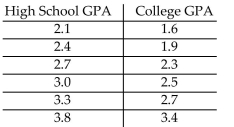 Use the least-squares line to estimate the college GPA for a student with a high school GPA of 3.5.
Use the least-squares line to estimate the college GPA for a student with a high school GPA of 3.5.
A) about 2.6
B) about 3.0
C) about 3.2
D) about 2.8
The table lists the high school grade-point averages of six students and their college grade-point averages after one year of college.
 Use the least-squares line to estimate the college GPA for a student with a high school GPA of 3.5.
Use the least-squares line to estimate the college GPA for a student with a high school GPA of 3.5.A) about 2.6
B) about 3.0
C) about 3.2
D) about 2.8

Unlock Deck
Unlock for access to all 78 flashcards in this deck.
Unlock Deck
k this deck
57
Evaluate.

A)
B)
C)
D)

A)

B)

C)

D)


Unlock Deck
Unlock for access to all 78 flashcards in this deck.
Unlock Deck
k this deck
58
Provide an appropriate response.
Use Lagrange multiplier to maximize f(x, y, z) = xy + z subject to
A) f(1, 1, 1) = 1
B) f(1, 1, 0) = 1
C) f(0, 1, 0) = 1
D) f(0, 0, 1) = 1
Use Lagrange multiplier to maximize f(x, y, z) = xy + z subject to

A) f(1, 1, 1) = 1
B) f(1, 1, 0) = 1
C) f(0, 1, 0) = 1
D) f(0, 0, 1) = 1

Unlock Deck
Unlock for access to all 78 flashcards in this deck.
Unlock Deck
k this deck
59
Solve the problem.
Consider the data showing the average life expectancy of woman in various years.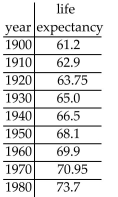 Find the regression line. Let the year 1900 represent x = 0.
Find the regression line. Let the year 1900 represent x = 0.
A) y = 8.3x + 22.1
B) y = 0.15x + 60.9
C) y = 0.37x - 21.8
D) y = - 0.11.2x + 23.1
Consider the data showing the average life expectancy of woman in various years.
 Find the regression line. Let the year 1900 represent x = 0.
Find the regression line. Let the year 1900 represent x = 0.A) y = 8.3x + 22.1
B) y = 0.15x + 60.9
C) y = 0.37x - 21.8
D) y = - 0.11.2x + 23.1

Unlock Deck
Unlock for access to all 78 flashcards in this deck.
Unlock Deck
k this deck
60
Provide an appropriate response.
Find the least squares line for the following data:
A) y = -0.3x + 1.2
B) y = 0.3x - 1.2
C) y = -0.13x - 1.2
D) y = 0.13x - 1.2
Find the least squares line for the following data:

A) y = -0.3x + 1.2
B) y = 0.3x - 1.2
C) y = -0.13x - 1.2
D) y = 0.13x - 1.2

Unlock Deck
Unlock for access to all 78 flashcards in this deck.
Unlock Deck
k this deck
61
Evaluate the integral.
Evaluate the integral with the order reversed.
A)
B)
C) 4
D)
Evaluate the integral with the order reversed.

A)

B)

C) 4
D)


Unlock Deck
Unlock for access to all 78 flashcards in this deck.
Unlock Deck
k this deck
62
Provide an appropriate response.
Find the volume of the solid under the graph of over the rectangle
over the rectangle 
A)
B)
C) -12
D)
Find the volume of the solid under the graph of
 over the rectangle
over the rectangle 
A)

B)

C) -12
D)


Unlock Deck
Unlock for access to all 78 flashcards in this deck.
Unlock Deck
k this deck
63
Provide an appropriate response.
Let R be the region bounded by the graphs of the equations Use set notation and double inequalities to describe R as a regular x region or regular y region, whichever is simpler.
Use set notation and double inequalities to describe R as a regular x region or regular y region, whichever is simpler.
A)
B)
C)
D)
Let R be the region bounded by the graphs of the equations
 Use set notation and double inequalities to describe R as a regular x region or regular y region, whichever is simpler.
Use set notation and double inequalities to describe R as a regular x region or regular y region, whichever is simpler.A)

B)

C)

D)


Unlock Deck
Unlock for access to all 78 flashcards in this deck.
Unlock Deck
k this deck
64
Provide an appropriate response.
Find the average value of the function over the shaded region. f(x, y) = 9x + y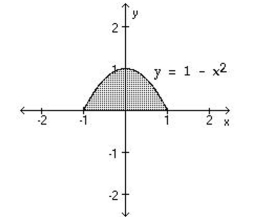
A)
B)
C)
D)
Find the average value of the function over the shaded region. f(x, y) = 9x + y

A)

B)

C)

D)


Unlock Deck
Unlock for access to all 78 flashcards in this deck.
Unlock Deck
k this deck
65
Provide an appropriate response.
Evaluate .
.
A)
B)
C)
D)
Evaluate
 .
.A)

B)

C)

D)


Unlock Deck
Unlock for access to all 78 flashcards in this deck.
Unlock Deck
k this deck
66
Provide an appropriate response.
Evaluate
A) 450
B) 30
C) -450
D) -480
Evaluate

A) 450
B) 30
C) -450
D) -480

Unlock Deck
Unlock for access to all 78 flashcards in this deck.
Unlock Deck
k this deck
67
Provide an appropriate response.
Find the double integral over the rectangular region R with the given boundaries.
A)
B)
C)
D)
Find the double integral over the rectangular region R with the given boundaries.

A)

B)

C)

D)


Unlock Deck
Unlock for access to all 78 flashcards in this deck.
Unlock Deck
k this deck
68
Provide an appropriate response.
Find the average value of over the rectangle
over the rectangle 
A) 8
B) 2
C) 1
D) 4
Find the average value of
 over the rectangle
over the rectangle 
A) 8
B) 2
C) 1
D) 4

Unlock Deck
Unlock for access to all 78 flashcards in this deck.
Unlock Deck
k this deck
69
Provide an appropriate response.
Find the double integral over the rectangular region R with the given boundaries.
A)
B)
C)
D)
Find the double integral over the rectangular region R with the given boundaries.

A)

B)

C)

D)


Unlock Deck
Unlock for access to all 78 flashcards in this deck.
Unlock Deck
k this deck
70
Solve the problem.
Under ideal conditions, if a person driving a car slams on the brakes and skids to a stop on wet pavement, the length of the skid marks (in feet) is given by the formula L(x, y) = 0.00002xy2, where x is the weight of the car in
Pounds and y is the speed of the car in miles per hour. What is the average length of the skid marks for cars
Weighing between 2500 and 3500 pounds and traveling at speeds between 45 and 55 miles per hour? Set up a
Double integral and evaluate.
A)
B)
C)
D)
Under ideal conditions, if a person driving a car slams on the brakes and skids to a stop on wet pavement, the length of the skid marks (in feet) is given by the formula L(x, y) = 0.00002xy2, where x is the weight of the car in
Pounds and y is the speed of the car in miles per hour. What is the average length of the skid marks for cars
Weighing between 2500 and 3500 pounds and traveling at speeds between 45 and 55 miles per hour? Set up a
Double integral and evaluate.
A)

B)

C)

D)


Unlock Deck
Unlock for access to all 78 flashcards in this deck.
Unlock Deck
k this deck
71
Provide an appropriate response.
Evaluate.
A) 5
B) -4
C)
D)
Evaluate.

A) 5
B) -4
C)

D)


Unlock Deck
Unlock for access to all 78 flashcards in this deck.
Unlock Deck
k this deck
72
Provide an appropriate response.
Give a verbal description of the region and determine whether R is a regular x region, regular y region, both, or neither.
and determine whether R is a regular x region, regular y region, both, or neither.
A) R consists of the points on or inside the rectangle with corners (±3, ±6); both
B) R consists of the points on or inside the rectangle with corners (±6, ±3); regular x region
C) R consists of the points on or inside the rectangle with corners (±6, ±3); both
D) R consists of the points on or inside the rectangle with corners (±6, ±3); neither
Give a verbal description of the region
 and determine whether R is a regular x region, regular y region, both, or neither.
and determine whether R is a regular x region, regular y region, both, or neither.A) R consists of the points on or inside the rectangle with corners (±3, ±6); both
B) R consists of the points on or inside the rectangle with corners (±6, ±3); regular x region
C) R consists of the points on or inside the rectangle with corners (±6, ±3); both
D) R consists of the points on or inside the rectangle with corners (±6, ±3); neither

Unlock Deck
Unlock for access to all 78 flashcards in this deck.
Unlock Deck
k this deck
73
Solve the problem.
An industrial plant located in the center of a small town emits particulate matter into the atmosphere. Suppose the concentration of particulate matter in parts per million at a point d miles from the plant is given by
C = 120 - 15d2. If the boundaries of the town form a rectangle four miles long and six miles wide, what is the
Average concentration of particulate matter throughout the city? Express C as a function of x and y, set up a
Double integral, and evaluate.
A)
B)
C)
D)
An industrial plant located in the center of a small town emits particulate matter into the atmosphere. Suppose the concentration of particulate matter in parts per million at a point d miles from the plant is given by
C = 120 - 15d2. If the boundaries of the town form a rectangle four miles long and six miles wide, what is the
Average concentration of particulate matter throughout the city? Express C as a function of x and y, set up a
Double integral, and evaluate.
A)

B)

C)

D)


Unlock Deck
Unlock for access to all 78 flashcards in this deck.
Unlock Deck
k this deck
74
Evaluate the integral.
Evaluate the integral with the order reversed.
A)
B) 1
C) 2
D) x
Evaluate the integral with the order reversed.

A)

B) 1
C) 2
D) x

Unlock Deck
Unlock for access to all 78 flashcards in this deck.
Unlock Deck
k this deck
75
Provide an appropriate response.
Find the double integral over the rectangular region R with the given boundaries.
A) 6
B)
C)
D) 8
Find the double integral over the rectangular region R with the given boundaries.

A) 6
B)

C)

D) 8

Unlock Deck
Unlock for access to all 78 flashcards in this deck.
Unlock Deck
k this deck
76
Provide an appropriate response.
Find the volume under the surface z = f(x,y) and above the rectangle with the given boundaries.
A) 26
B) 38
C) 28
D) 36
Find the volume under the surface z = f(x,y) and above the rectangle with the given boundaries.

A) 26
B) 38
C) 28
D) 36

Unlock Deck
Unlock for access to all 78 flashcards in this deck.
Unlock Deck
k this deck
77
Provide an appropriate response.
Find the double integral over the rectangular region R with the given boundaries.
A) 18
B) 36
C) 10
D) 27
Find the double integral over the rectangular region R with the given boundaries.

A) 18
B) 36
C) 10
D) 27

Unlock Deck
Unlock for access to all 78 flashcards in this deck.
Unlock Deck
k this deck
78
Provide an appropriate response.
Evaluate
A) -12
B) 15
C) 12
D) 24
Evaluate

A) -12
B) 15
C) 12
D) 24

Unlock Deck
Unlock for access to all 78 flashcards in this deck.
Unlock Deck
k this deck



